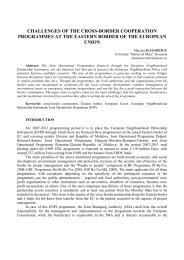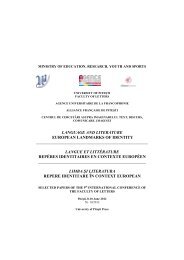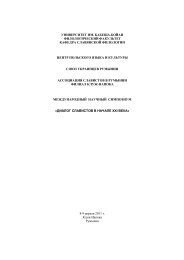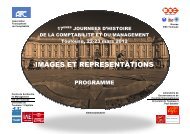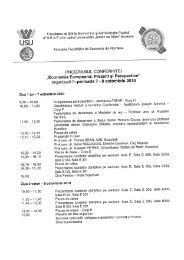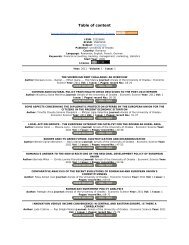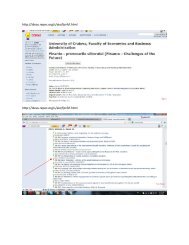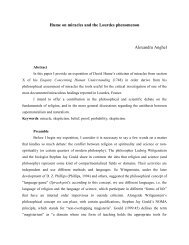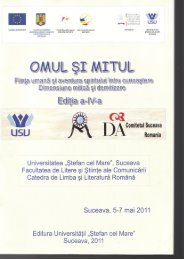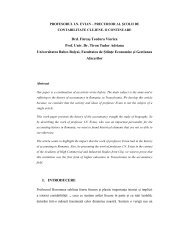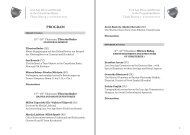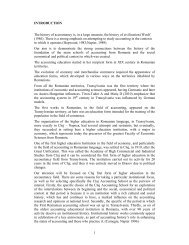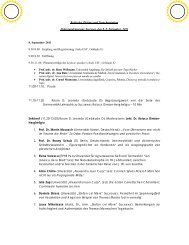La traduction caduque, retraduction et contexte culturel (en ...
La traduction caduque, retraduction et contexte culturel (en ...
La traduction caduque, retraduction et contexte culturel (en ...
Create successful ePaper yourself
Turn your PDF publications into a flip-book with our unique Google optimized e-Paper software.
TRADUCTION ET RETRADUCTION DE LA LITTERATURE<br />
QUÉBÉCOISE EN ROUMANIE (1970-2010)<br />
El<strong>en</strong>a-Brânduşa STEICIUC 1<br />
Abstract. The Fr<strong>en</strong>ch-Canadian literature started to interest the Romanian<br />
editors and translators in the second half of the 20th c<strong>en</strong>tury, after a vivid<br />
interest in academic fields. Some of the major difficulties in its translation<br />
occur wh<strong>en</strong> we have to deal with specific terms, defined as culturèmes, or<br />
wh<strong>en</strong> the specific style of an author – Louis Hémon, Gabrielle Roy, Anne<br />
Hébert, Yves Beauchemin, Jacques Poulin – requires a perfect mastery. During<br />
the 40 years b<strong>et</strong>we<strong>en</strong> 1960 and 2010, the ph<strong>en</strong>om<strong>en</strong>on of translating these<br />
authors witnessed a certain dynamics and a progress can be se<strong>en</strong>, which allows<br />
us to speak of r<strong>et</strong>ranslation. The article <strong>en</strong>umerates several translations and<br />
shows the weak and strong points in translating the cultural aspects of these<br />
works.<br />
Keywords. Fr<strong>en</strong>ch-Canadian literature, Québec id<strong>en</strong>tity, culturèmes,<br />
québécismes, dynamics, r<strong>et</strong>ranslation<br />
<strong>La</strong> littérature québécoise est une littérature relativem<strong>en</strong>t jeune,<br />
exprimant l’id<strong>en</strong>tité des francophones qui viv<strong>en</strong>t <strong>en</strong> Amérique du nord.<br />
Une continuelle interrogation traverse c<strong>et</strong>te littérature, de même qu’une<br />
« interrogation sur le s<strong>en</strong>s que peut avoir l’expression d’une<br />
communauté qui fut abandonnée par l’histoire, coupée de ses racines,<br />
soumise à une domination étrangère ». (Morel, 2007 : p. 13) Si, depuis<br />
ses débuts jusqu’à la « Révolution tranquille » des années 60 du XX ème<br />
siècle, c<strong>et</strong>te production était largem<strong>en</strong>t dép<strong>en</strong>dante du canon de<br />
l’Hexagone (comme l’étai<strong>en</strong>t d’ailleurs toutes les littératures des<br />
« périphéries » du monde francophone), à partir des années 70 on<br />
observe une indép<strong>en</strong>dance croissante par rapport à la France. Pourtant,<br />
même après, ce sont les grands prix littéraires français attribués à divers<br />
auteurs québécois qui les consacr<strong>en</strong>t définitivem<strong>en</strong>t dans la<br />
« République des l<strong>et</strong>tres ».<br />
Appelée «canadi<strong>en</strong>ne-française » à ses débuts, c<strong>et</strong>te littérature<br />
puissamm<strong>en</strong>t influ<strong>en</strong>cée par celle du «c<strong>en</strong>tre » a donné des ouvrages<br />
1 Université Stefan cel Mare, Suceava, Roumanie, sel<strong>en</strong>abrandusa@yahoo.com<br />
127



